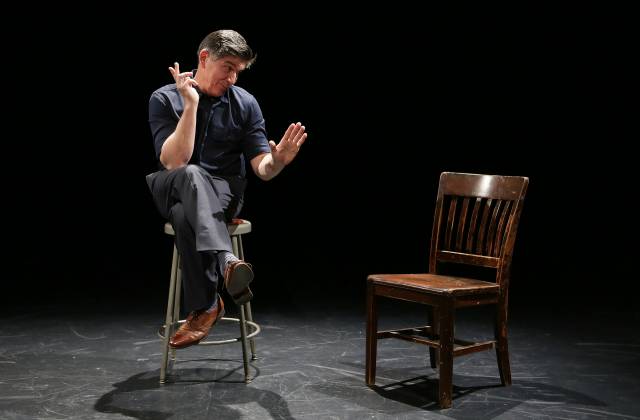

You may call what James Lecesne does in The Absolute Brightness of Leonard Pelkey (at Dixon Place) what you will — performance art, a one-man-show, a monodrama. What it is, decidedly, is an invigorating theatre experience, both moving and highly entertaining.
I previously saw Lecesne in a solo show in the mid-1990s, when he performed Word of Mouth in Portland, Oregon. One of the playlets in Word of Mouth centered on Trevor, a troubled gay teenager. Trevor later turned up in a short film that bore his name; the film won an Oscar and inspired The Trevor Project, an acclaimed crisis-intervention and suicide-prevention organization that serves LGBTQ youth.
Leonard Pelkey — whom Lecesne introduced in his 2008 young-adult novella Absolute Brightness — might have made a good confidant for Trevor. Despite having had a miserable early childhood, Leonard is an uninhibited, optimistic and outgoing young man. He owns his flamboyance with the confidence of an Auntie Mame, if Auntie Mame somehow found herself living in the person of a skinny 14-year-old gay boy in an unremarkable town on the Jersey shore in the early 21st century.
But as the play opens, there is a problem: Leonard Pelkey is missing. Not lost, his guardian, Ellen Hertle, insists. Just missing. There’s a difference, says Ellen.
The play is partly a detective story, narrated by a seemingly hardboiled police officer named Chuck DeSantis. Chuck is on the case to determine what has happened to Leonard. His investigation concludes fairly early in the 80-minute play. But what Chuck learns about (and from) Leonard turns out to be something more profound than he ever expected to find.

With remarkable control and a bold theatrical presence, Lecesne portrays Chuck DeSantis, Ellen Hertle, Phoebe Hertle (Ellen’s daughter), and numerous other memorable, individuated characters. He’ll be Chuck one moment, then he’ll quickly pivot his body and be someone else. His physical embodiment of the characters is full of telling details. For instance, his Buddy Howard, the camp British proprietor of a local drama and dance school, speaks the word “tap” and, as if by reflex, executes a quick “ball change” dance step. As chain-smoking Marion Tochterman, a friend of Ellen’s, Lecesne inhales from an imaginary cigarette, but exhales the precious smoke only after speaking a phrase or two.
As impressive as his “presto change-o” act is, the more wonderful aspect of Lecesne’s art is that he somehow allows you to stop being impressed with what he’s doing and instead become drawn into the story he’s telling. What part his director, Tony Speciale, played in creating the magic, I don’t know. But when he’s on the nearly bare stage itself, Lecesne is pretty much on his own, aside from the clever, sparely used animated projections by Matthew Sandager and some incidental music composed by Duncan Sheik.